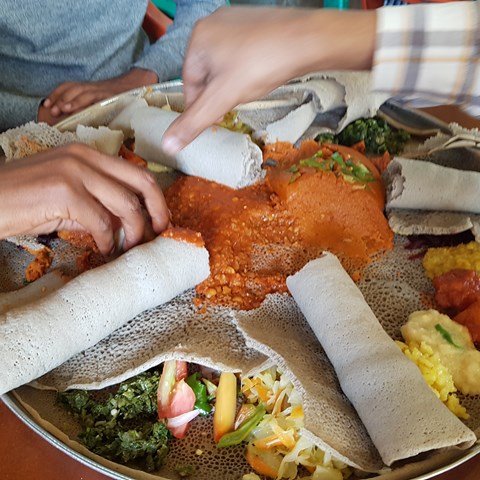Challenges of securing water for food and nutrition

A secure and sustainable water supply in agriculture is fundamental to acheive food and nutrition security for all. Addressing the problems of increasing water scarcity and drought requires efforts for improved and innovative water management. In a recently published report by the Food and Agriculture Organization of the United Nations (FAO), one highlights how ensuring efficient water use, modernising technology, financing and effective policies are necessary measures needed to meet the growing water-related challenges globally. SLU researcher Jennie Barron has contributed to the report.
While hunger was on the rise already before 2020, about 100 million more people are now pushed into hunger due to the COVID-19 pandemic. This means that it is getting increasingly difficult to reach Sustainable Development Goal 2 (SDG2) Zero hunger by 2030.
Globally, food systems are also subject to a range of challenges, from increasing incidence of extreme weather, degradation of soil and water, to limited investments into research, innovation, farm technology and capacity to adapt and improve to the new farming context. One key issue is addressing the water security for food production and food systems. Today, 60% of food and nutrition is still produced in rainfed systems, approximately 80% of cropland and all grassland. Hence, managing water in these areas is critical in order to achieve water security, and reduce reliance on irrigation systems for food and nutrition security.
We asked Jennie Barron, Professor at the Department of Soil and Environment, who has contributed to the SOFA report Overcoming water challenges in agriculture to tell us more:
- This is the first SOFA report since the 90s dedicated to the importance of water security for food and nutrition. It presents the existing and projected challenges of securing water for agricultural production both in rainfed and irrigated systems. This year with added burden of health crises such as COVID-19 alongside accelerating climate change, population growth and ongoing dietary change.
- The report estimates a 1.2 billion people living in areas of water scarcity, both due to over-appropriation of freshwater resources, combined with incidence of droughts. In these areas, the majority of these people are doubly burdened by water scarcity, food and nutrition insecurity, and poverty, mostly in peri urban and rural areas. Adding areas with severe drought frequency, the total population under water security stress is estimated to 3.2 billion.
- To overcome these challenges, agricultural production systems need to be considered both for water security, investments capacity and sustainability dimensions. SLU together with partners, contributed background case studies from India, Ethiopia, Central America and Brazil showing how scaling agricultural water management can help smallholder farmers intensify under water-scarce conditions. For example, in the semiarid area of Bhundelkand India led by International Crop Research Institute for the Semi-Arid tropics (ICRISAT), farmers with researchers have implemented multiple soil and water structures, with innovative design, to adapt to current climate trends.
- This case study show the importance of on-the-ground research support to monitor water impacts of the new innovations implemented and scaled. In another case study from central America, the Catholic Relief Services (CRS), show how it is necessary to use evidence-based knowledge to improve and build capacity, to intensify rainfed crop production, soil and water management and farmer incomes. Through the background work, it was clear that research and innovation was a main component of sustainable intensification and scaling in these case studies.
SLU’s contribution
SLU with partners Stockholm International Water Institute, International Crops Research Institute for the Semi-arid Tropics, Catholic Relief Services and The European Conservation Agriculture Federation, have provided two background documents (in process of production) and Jennie Barron have reviewed the main sections of the report during the process of development. The produced background documents focus on the value and relevance of intensifying rainfed systems, the potential and the options for contributions to SDGs and water security.
For more information please contact Jennie Barron jennie.barron@slu.se
Links
Overcoming water challenges in agriculture
The State of Food and Agriculture, one of FAO's major annual flagship publications, aims at bringing to a wider audience balanced science-based assessments of important issues in the field of food and agriculture. Each edition of the report contains a comprehensive, yet easily accessible, overview of a selected topic of major relevance for rural and agriculture development and for global food security.